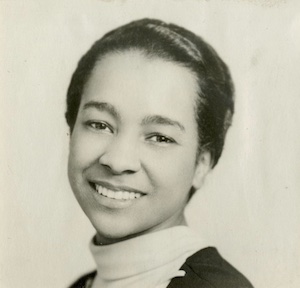By Sam Semerau
When she became a student at the University of Michigan in 1937, Jean Fairfax lived in off-campus housing due to racial segregation at the university. By Fairfax’s senior year in 1940, she helped found the all-women’s Muriel Lester Cooperative House. It was the university’s first interracial housing exclusively for women.
Fairfax was born in Cleveland, Ohio, where she was raised with strong religious values. After graduating as a member of ΦBK from the University of Michigan in 1941, Fairfax went on to earn her masters in comparative religion from the Union Theological Seminary in New York in 1944.
Fairfax’s work in desegregation did not end at the University of Michigan. Following her years as the Dean of Women at Kentucky State College and the Tuskegee Institute, Fairfax began working with the American Friends Service Committee (AFSC). By 1957, she had become the director of AFSC’s Southern Civil Rights program. Only three years following the Brown v. Board of Education Supreme Court decision, which deemed education segregation unconstitutional, she worked closely with Black families affected by school desegregation cases and informed the families of their constitutional rights to education in the face of potential hostility from white schools.
“Someone had to break the pattern,” said Fairfax in an 1984 interview with the Christian Science Monitor, “And very often the civil rights revolution was initiated by the most vulnerable black persons. Many of them were women and many of them were children—tough, resilient, hopeful, beautiful children. The greatest experience of my life was standing with them as they took the risks.”
In 1965, Fairfax joined the NAACP Legal Defense and Educational Fund (LDF) as the Director of Community Services. She continued her work organizing with Black families as schools gradually desegregated and opened to further integration. Fairfax also worked with secondary institutions, advocating to keep historically black colleges and universities open, funded, and integrated.
“She became the most influential single staff member in determining the direction we took on such issues as the integration of black colleges and which industries we should target in employment cases,” wrote Jack Greenberg, a former director-counsel of the LDF, in his book, Crusaders in the Courts.
Fairfax concluded her career with the LDF in 1984 and moved to Phoenix, Arizona, with her sister, Betty. The sisters focused on philanthropy and contributed to a myriad of causes, often involving social equity and education.
“I’m just doing what I ought to do,” Fairfax said in an article for the National Center for Family Philanthropy. “In a way you don’t separate these things. What you do as a volunteer, what you do with your money, what you do professionally, they’re all one piece.”
The sisters spent the rest of their years continuing to contribute around $100,000 to philanthropic causes. Betty Fairfax passed away in 2010, followed by Jean Fairfax’s passing in 2019 at 98 years old.
Fairfax’s life continues to be honored at the University of Michigan. In 2020, University of Michigan Professor Celeste Watkins-Hayes named her professorship the Jean E. Fairfax Collegiate Professorship of Public Policy. She is also the namesake of the Jean Fairfax Scholarship, awarded to academically and service achieving high school seniors in underserved school districts.
Sam Semerau is a recent graduate of Albion College with a degree in English and history. She was inducted into Phi Beta Kappa there in April 2022. Albion College is home to the Beta of Michigan chapter of Phi Beta Kappa.




